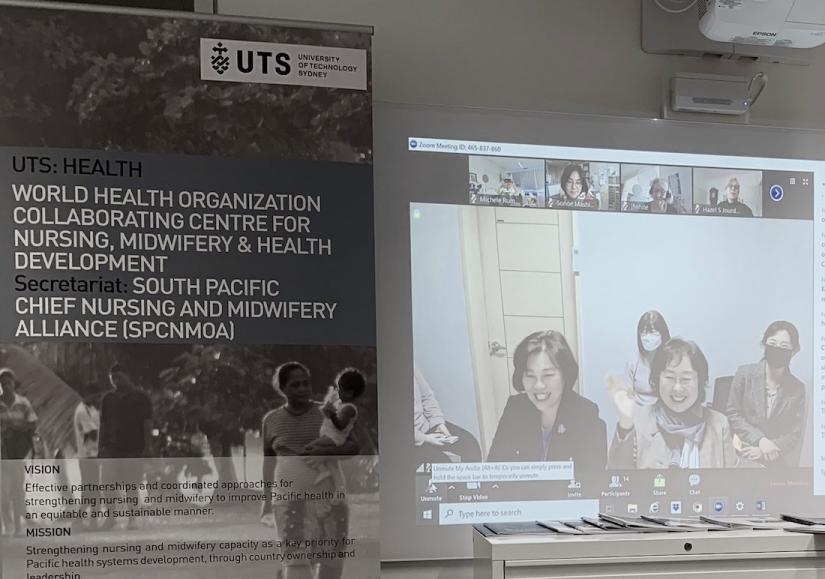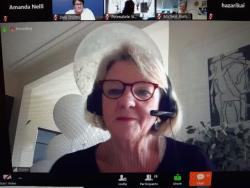Coinciding with World Health Day, the first State of the World’s Nursing 2020 Report was launched globally on 7 April 2020. This important report has been developed by WHO in partnership with the International Council of Nurses and the Nursing Now campaign, and with the support of governments and partners from around the world. The report highlights the vital role of nurses in the provision of health care, and presents a compelling case for governments and partners to take more decisive action to strengthen and support the nursing workforce.
‘Nurses are the backbone of any health system. Today, many nurses find themselves on the frontline in the battle against Covid-19,’ said Dr Tedros Adhanom Ghebreyesus, WHO Director General. ‘This report is a stark reminder of the unique role they play, and a wakeup call to ensure they get the support they need to keep the world healthy.’
The report provides a technical description of the nursing workforce worldwide and emphasises their contribution in delivering Universal Health Coverage and the Sustainable Development Goals. The report draws on data compiled from 193 countries, including 31 member countries and territories in the Western Pacific Region.
Nursing in the Western Pacific - Facts and Figures
- The global nursing workforce is around 28 million, of which more than 19 million are professional nurses.
- The Western Pacific Region has around 7 million nurses, who comprise a quarter of the global nursing workforce.
- 95% of the nurses in the Western Pacific Region are women.
- Half (51%) of nurses in the Western Pacific Region are below 35 years of age
- One nurse out of three (33%) in the Region is born or trained in a country other than their current country of practice.
- In 2018, the shortage of nurses in the Region was estimated to be 350,000. 89% of this shortage is concentrated in low- and lower middle-income countries.
Box 6.9 of Report highlights leadership fellowship in the Western Pacific Region
The report highlights the successful WHO CC UTS Australia Awards Fellowships leadership and mentorship program in partnership with the South Pacific Chief Nursing and Midwifery Officers Alliance (SPCNMOA) (318). The leadership program focused on human resources for health, collective cultures, teaching mentorship, policy implementation and links with universal health coverage. Impact assessment involved more than 300 stakeholders and program participants from 14 countries (318).
Virtual Online Event at WHO CC UTS

To celebrate the launch of the State of the World’s Nursing report and World Health Day in 2020 The Year of the Nurse and The Midwife, the WHO CC UTS held an online event/webinar on 9 April for colleagues from around the Western Pacific region.
Presenters included:
- Dr Indrajit Hazarika - Regional Adviser, WHO Western Pacific Regional Office (WPRO)
- Prof Debra Thoms - Acting Head of School Nursing, QUT; former Chief Nursing Officer of Australia; Australian representative, WHO Executive Board
- Prof Jill White- Nursing Now Board Member for Western Pacific region
- Ms Michele Rumsey -WHO CC UTS Director and webinar facilitator
Commentary
Over 30 colleagues joined the webinar from UTS, WHO and countries around the Western Pacific region and beyond, including the Cook Islands, Indonesia, Japan, New Zealand, Papua New Guinea, Republic of Korea, Samoa, The Philippines, Tuvalu and Australia.
Michele Rumsey from the WHO CC UTS welcomed participants to the webinar, introduced the four speakers, and moderated the sessions. She noted that the Tongan Minister for Health, Dr Amelia Latu Afuha'amango Tu’ipulotu was unable to attend due to the impact of Cyclone Harold on Tonga currently.
After showing a short video illustrating and thanking nurses and midwives for the important work that they do, Dr Indrajit Hazarika (WHO WPRO) spoke about the key highlights, achievements and findings from the State of the World’s Nursing 2020 Report. He acknowledged this as an opportunity to understand the vital role of nurses and their contributions at the front line of health care delivery.
Dr Hazarika thanked WHO CC UTS for organising webinar and for their continued support and contribution to strengthening nursing and midwifery practice, and congratulated the Centre on its redesignation as a WHO Collaborating Centre. He also thanked other WHO Collaborating Centres and those who contributed to the SOWN report.
Professor Debra Thoms provided a brief overview of the history and development of the SOWN Report, and her involvement through the WHO Executive Board. She noted the achievement of delivering this report in under 12 months and focussed on some of the specific nursing issues highlighted in the report and the importance of nursing leadership. The report showed that 80 countries had nurses in senior leadership positions and the recommendations for increasing nursing leadership opportunities globally.
The report provides evidence that nursing leadership needs to be further engaged and supported at all levels of the health system.
- Professor Debra Thoms

Professor Jill White shared the news of continuation of the Nursing Now campaign until mid 2021 and its aim to send clear messages to governments in the region and around the world and the need to listen and respect nurses and the work that they do. She also spoke of the SOWN Report and thanked all nurses involved, and WHOCCUTS for bringing the South Pacific CNMOs together to support their data collection and contribution to the report. She highlighted some specific statistics from the report – that nurses make up 60% of the global workforce with WPRO having the highest proportion of nurses in the professional workforce, and the challenge of the distribution of nursing services with 80% of the world’s nurses providing care for 50% of the world’s population.
Nursing needs to speak with one voice at a national level
- Professor Jill White
She also acknowledged the UTS WHO CC nursing leadership program and explained how important leadership programs like this are, with 85% of participants having positive career progression, six becoming Chief Nursing Officers and two becoming Ministers for Health. Professor White concluded by suggesting that WHO needs to appoint more nursing officers and advisers in regional offices, and every country in the region also needs a Chief Nursing Midwifery Officer.
After further discussion about the SOWN Report, online country profiles and future usability, the webinar was concluded.
Speakers expressed their gratitude to all nurses and health workers who contributed to the Report and to health care provision around the world.
Professor Suzanne Chambers, Dean Faculty of Health and Professor Tracy Levett-Jones, Head of School Nursing and Midwifery at UTS commented on the SOWN Report:
This report is so important as data on the global nursing workforce enables us to navigate change. When we answer the call to care for others, our compassion extends beyond borders and barriers to empower communities to overcome disease, disruption, and avoidable deaths. Today, more than ever, we can be proud that amid great turmoil, our actions and achievements make a difference and are fundamental to our humanity, promoting peace and prosperity worldwide.
Media
Video recap of the webinar event can be accessed here: Webinar Recap.
WHO Regional Office for the Western Pacific video on the Year of the Nurse and Midwife.
Nursing Now - Jill White on the release of the State of the World's Nursing Report.
Documentation
WHO State of the Worlds Nursing Report PDF
Meeting Summary for State of the Worlds Nursing Report for Chief Nurses and Midwives PDF

